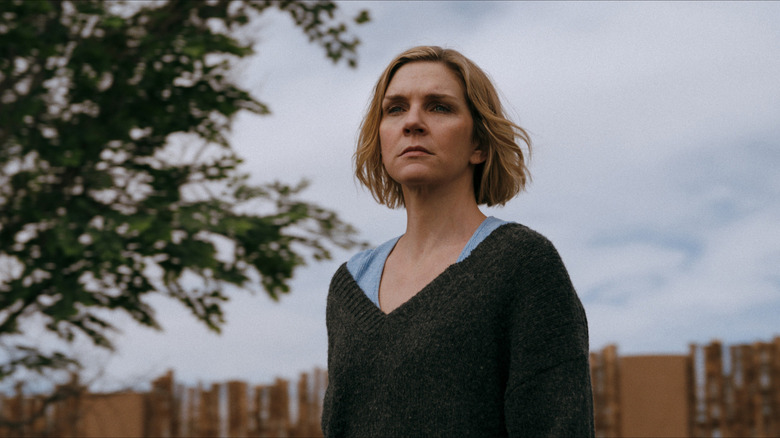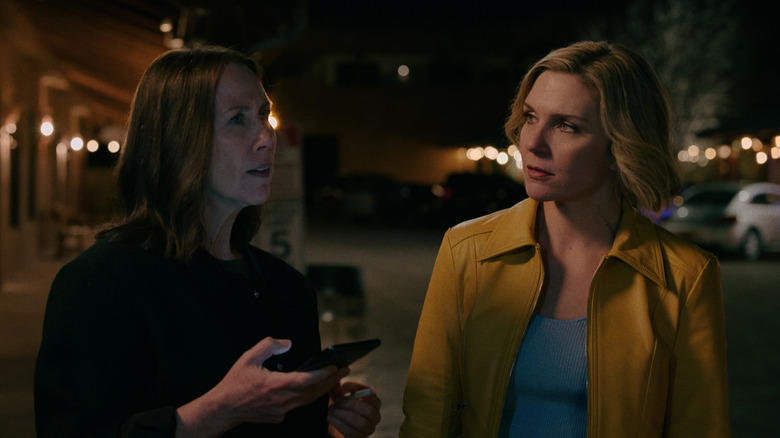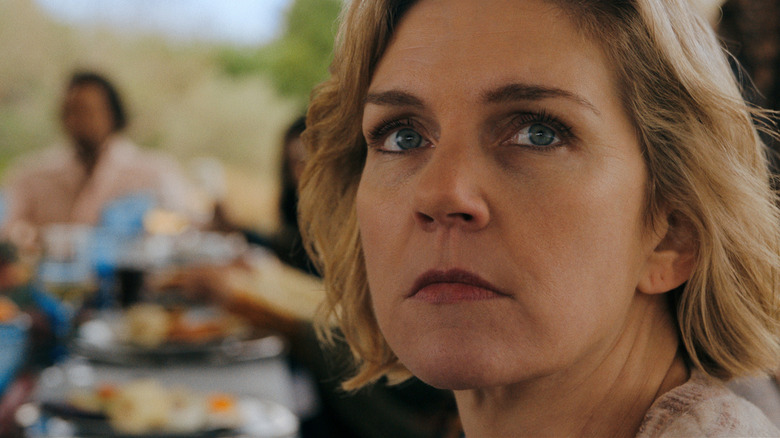Pluribus Review: Rhea Seehorn Is Superb In This Peculiar Sci-Fi Series From The Creator Of Breaking Bad
Two unexpected things came out of "Better Call Saul," the prequel to the acclaimed "Breaking Bad." First: the series, which sounded like a bit of a joke on paper ("A show about Walter White's buffoonish lawyer!") turned out to be better than "Breaking Bad." Second: Rhea Seehorn's Kim Wexler, a character who had absolutely no connection to "Breaking Bad" at all, became the best aspect of the series. Kim's ascension to "best character" status was, of course, due to some great writing. But it was also the result of Seehorn's incredible performance. Seehorn wasn't a new actor when she landed the Kim Wexler role, but it's fair to say it's the part that really made people sit up and pay attention to her. That included the "Better Call Saul" writers, who sensed how good Seehorn was and kept expanding Kim's character as the seasons ticked on.
Now, "Breaking Bad" and "Better Call Saul" creator Vince Gilligan has built an entire new show around Seehorn, and it's easy to understand why: she's phenomenal. It can be a tricky thing to explain what makes a good actor so good at their job. Is it in how big they take their performances ... or how subtle they play things? Is it due to their dialogue delivery, or their physicality? Opinions differ. If I had to pin down what it is that makes Seehorn so good at what she does, I'd say it's all in how she listens during a scene. Seehorn has a unique gift to really make it seem like her characters are digesting what they're experiencing. She has vivid blue eyes that are uniquely bright in a way that helps you imagine the various ways her characters are internalizing things; you can really get a sense of the gears turning in her head.
In "Pluribus," the new odd, off-beat, melancholy sci-fi comedy-drama Gilligan has created for Apple TV, Seehorn occupies nearly every moment. While "Breaking Bad" and "Better Call Saul" had main characters, they were also very much ensembles (especially "Saul"). "Pluribus," in sharp contrast, is Seehorn's show, and she doesn't waste this opportunity, delivering a sharp, knock-out performance while playing an incredibly tricky character juggling a host of emotions.
Pluribus is a sci-fi show with a familiar premise given a unique twist
It's difficult to talk about "Pluribus." The marketing has played things extremely close to the vest, and it's definitely the type of show where the element of surprise is essential. But watching, I was reminded of a line from John Carpenter's "In the Mouth of Madness," which sees the world being overrun by supernatural monsters dreamed up by a best-selling horror novelist. When discussing the idea of the "real" world as we know it disappearing and being overrun by supernatural beings, a character ominously says: "It would be pretty lonely being the last one left." Loneliness is at the heart of "Pluribus," which follows a main character who has spent a long time isolating herself even while embracing a very public lifestyle. And then a world-shattering event happens that almost literally makes her "the last one left."
Seehorn plays Carol Sturka, a wildly successful author who churns out pulpy pirate romance books. These books sell well and have amassed a legion of obsessive fans, but Carol resents them. She thinks they're "mindless crap" and she's been secretly plugging away a "serious" novel for years. While Carol attends public events where eager readers line up for hours to meet her, the seemingly only real human connection she has in the entire world is with Helen (Miriam Shor), her manager. Helen is also Carol's girlfriend, although it appears that the bestselling author has kept her sexual orientation a secret in order to better sell her romance books.
Carol clearly loves Helen and enjoys their time together, but she apparently has no other friends or family, choosing instead to live in (wealthy) solitude. Carol's intentional separation from the rest of the human race becomes even more literal after a series of sci-fi-tinged events cause a virus to sweep across the planet and turn seemingly everyone into an extremely cheerful, extremely helpful, extremely nice collective unit. It's an "Invasion of the Body Snatchers"-ish scenario, but without the screaming horrors. By default, Carol has now become the most miserable person on Earth, simply because she's immune to whatever has changed people. To her, this is understandably horrifying; she sees those who have been changed as lobotomized drones who have lost their individuality and humanity.
Pluribus is a good show made even better by Rhea Seehorn's performance
That's where "Pluribus" gets really interesting. Because while you can argue Carol has a point and that she's correct, you can also argue that maybe, just maybe, this drastic change isn't so bad? That might be a tough pill to swallow, but "Plurbius" underlines it again and again by showing us that people "infected" with the virus are unfailingly kind and helpful and that civilization has become far more inviting than it's ever been. These are not war-like alien invaders; they're a peace-loving civilization that wants to find ways to make our crummy planet a better place. But at what cost?
"Pluribus" is wildly inventive and fascinating in how it unfolds this story. Gilligan's shows have a fondness for long montages showing people doing things: performing menial, even mundane tasks in intricate, almost ritualistic fashion, and "Plurbius" continues this trend. There are lengthy, silent sequences where we watch Carol go about her life in a drastically altered world. There's even more going on here that I won't dare spoil, and there are a handful of other characters besides Carol (Karolina Wydra is particularly memorable as the unfailingly polite Zosia, who comes into Carol's life unexpectedly). But this is ultimately Carol's story (or at least it is for the seven episodes provided to critics), which means Seehorn has to do the bulk of the heavy lifting.
She's more than up for the challenge, playing Carol as a prickly, wounded individual with emotional baggage that she tries to keep tamped deep down inside herself until it all comes spilling out. Seehorn has an extremely difficult task here, because Carol has to somehow be both hero and villain. We understand why she's perturbed by the sudden shift in the world ... but we can't help but wonder if maybe, just maybe, things have gotten better for everyone else. Or maybe not. I'm sure Gilligan and company have more than a few tricks up their sleeve to come. Carol is also a unique character in that she both wants to be alone and she suffers from crushing loneliness, which is a mixture of emotions that you can't really understand unless you've experienced it yourself.
While "Pluribus" feels inspired by familiar titles such as "The Twilight Zone," "The X-Files," and even Robert Zemeckis' underrated "Contact," it's also wholly unique, unlike any other show on the air or streaming right now. It's not easy to pin-down, but it's endlessly fascinating and watchable, with nearly every episode containing at least one show-stopping set piece. But the truly impressive element here is Rhea Seehorn, who once again proves that she's one of the best actors working today, long overdue for this moment at the center of the spotlight. I found the story of "Pluribus" engaging, but it's Seehorn's performance that will keep me coming back for more.
/Film Rating: 8 out of 10
The nine-episode drama series "Pluribus" will make its global debut on Apple TV with its first two episodes on Friday, November 7, 2025, followed by new episodes every Friday through December 26. It's already been renewed for a second season.


